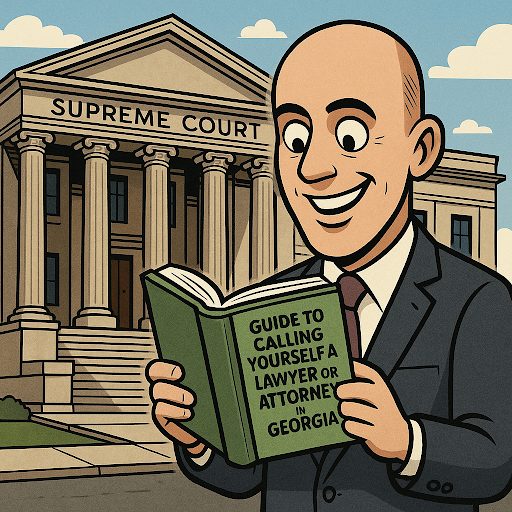
Written by Scot Goins, Associate Dean of Academic Achievement, Bar Success, and Data Analytics
For recent law graduates in Georgia, waiting for bar exam results can feel like an eternity in limbo—caught between the rigors of studying for and taking the bar exam and the professional privilege of practice as an admitted member of the State Bar of Georgia. While it’s tempting to celebrate early or update one’s social profiles to reflect the years of hard work invested in arriving at this stage, it’s essential to be cautious with the use of titles. Law school graduates need to be mindful that under Georgia law, referring to oneself as a “lawyer” or “attorney” before passing the bar exam and being sworn in may not only be misleading—it could violate state law and ethics regulations. Although different jurisdictions and sources might suggest otherwise, such as this one by Daniel Braff that appeared in the ABA Journal, Georgia law and professional rules are quite clear on the subject.
Relevant Georgia Law and Definitions
Georgia law protects the public from the unauthorized practice of law (UPL). O.C.G.A. § 15-19-51(a)(1) makes it unlawful for anyone “not a duly licensed attorney at law” to advertise or hold themselves out as a lawyer:
“It shall be unlawful for any person … [t]o practice or appear as an attorney at law for another in any court of this state … or in any manner to hold himself or herself out to the public or otherwise as being entitled to practice law.”
The Georgia Rules of Professional Conduct, which apply to all who are admitted (and by extension, to bar applicants, especially when acting under others’ supervision), make clear under Rule 5.5 that only those licensed may present themselves as able to represent others in legal matters.
The Distinction: Juris Doctor vs. Licensed Attorney
- Juris Doctor (J.D.): Graduation from law school means you have earned a J.D., an academic degree. It does not entitle you to represent clients, appear in court, or use the titles “lawyer” or “attorney” in any professional capacity.
- Lawyer/Attorney: In Georgia, a “lawyer” or “attorney” is someone who has passed the bar exam, passed the character and fitness requirements, and has been formally admitted to the State Bar of Georgia and sworn in by a judge.
Legal Risks of Prematurely Using “Lawyer” or “Attorney”
- Unauthorized Practice of Law (UPL): In Georgia, holding oneself out as a “lawyer” or “attorney” (in business cards, email signatures, social media, or job applications) without admission to the bar may constitute the unauthorized practice of law, subject to civil penalties and even criminal charges.
- Bar Admission Consequences: The State Bar character and fitness review specifically considers false or misleading representations. Calling yourself a “lawyer” prematurely may be seen as dishonesty, affecting your eligibility for admission.
- Professional Reputation: Employers, clients, and peers expect clear honesty regarding qualifications. Misrepresenting your status can damage credibility, even if unintentional.
- Specifically, O.C.G.A. § 15-19-51(a)(7) states that it shall be unlawful for any person:
To assume or use or advertise the title of “lawyer,” “attorney,” “attorney at law,” or equivalent terms in any language in such manner as to convey the impression that he is entitled to practice law or is entitled to furnish legal advice, services, or counsel;
Ethical and Practical Alternatives Before Admission
- Identify as a “J.D.,” “law school graduate,” or “pending bar admission.”
- Use accurate language, such as “bar candidate,” “awaiting bar results,” or “not yet admitted to practice.”
- Avoid signing legal correspondence or appearing in any role reserved for lawyers (unless authorized and appropriately supervised under the Student Practice Rules in Georgia).
Conclusion
While completing law school is a tremendous achievement, using the terms “lawyer” or “attorney” in Georgia requires bar exam passage and formal bar admission. Georgia’s laws and ethical rules are clear: only those admitted to the bar can hold themselves out as authorized to practice law. Waiting to use those titles protects your future career and upholds the integrity of the legal profession.
These requirements and their practical implications are discussed and referenced in legal guidance from the State Bar of Georgia and O.C.G.A. § 15-19-51(a)(1).
